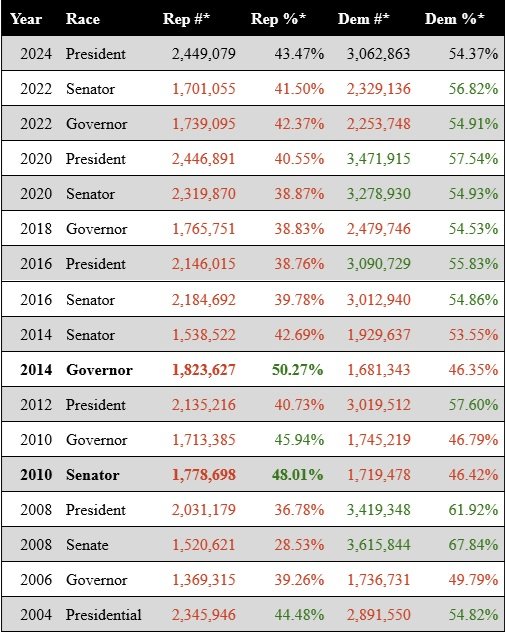Guest Post: The Case for Republican Optimism
Donald Trump holds a rally near Quincy in 2021.
NOTE: This story was originally posted for subscribers only. To receive subscriber-only newsletters and content, click here.
OPINION
By Mark Cavers, Republican Political Consultant
As Republicans in Illinois, we too often fall victim to a self-fulfilling prophecy of defeat. We get caught in a cycle of pessimism, quoting old losses instead of building new victories.
It’s time to snap out of it. There is a real case for optimism—and for rolling up our sleeves and continuing to work.
Imagine a state where Democrats are in complete control. That state is suffering the worst inflation in a generation, has the second-highest property taxes and worst outmigration in the nation, where the cost of housing, education, and medical care is skyrocketing, and where government services—from schools to public transit—are failing.
Now imagine that same state is seeing a major political shift: where President Trump improved his margin by six points cycle-over-cycle, where working-class and minority voters are breaking away from the Democratic coalition, where the incumbent governor barely cleared 54% in 2022 despite massive advantages, and where the Democrat mayor of the state’s largest city has a 6.6% favorable rating.
If I told you all that, you’d think Republicans were poised for a comeback. If I told you that state is Illinois, you might laugh. Maybe you shouldn’t.
We may not see a Republican sweep in 2026, but let me offer three real, structural reasons for optimism.
First, Illinois is starting to follow the national realignment.
In 2024, Donald Trump won more votes than any Republican presidential candidate in two decades:
He improved his share in every region of the state. In Cook County alone, he picked up 25,000 votes and gained 4% in Chicago proper, including huge gains in working-class neighborhoods like the 16-point swing in the 13th Ward.
This wasn’t a fluke. Nationwide, Republican support is growing among working-class and minority voters. Democrats are losing ground in key urban and suburban communities where families feel alienated by progressive policies and rising costs.
This realignment is happening organically.
No, Trump didn’t win Illinois—and so we shouldn’t all try to replicate him. He still only got 43.5% of the vote. But his success with working-class voters shows the power of a populist message delivered by an authentic messenger who demonstrates he will fight for ordinary people.
Our path forward depends on offering a vision, message, and candidates who can continue to grow our support among these voters.
At the same time, the Democrat coalition is splintering. Their party is being pulled further left by an activist base that increasingly alienates the multi-racial, working-class voters who were once its base.
Their coalition is cracking. Ours is growing.
Secondly, Governor Pritzker looks formidable—an incumbent billionaire with endless money and a polished campaign infrastructure. However, beneath the surface, he has real vulnerabilities.
In a year he should have dominated, Pritzker’s 2022 re-election victory was underwhelming.
He spent nearly $30 million meddling in the GOP primary
He faced a fractured and underfunded Republican opposition in a shortened window that never could define the race or the choice
He was given billions in federal COVID dollars, allowing him to pass popular legislation like tax cuts on groceries while drastically increasing spending
There were many more reasons he should have won big, but despite all of that, Pritzker received less than 55% of the vote. If that is his ceiling, imagine his floor.
And his image isn’t great now. In dozens of suburban polls in 2024, Pritzker’s image was consistently mediocre. He’s just not that popular.
He’s put himself in a little bit of a messaging box. He pledged (and tried) to make Illinois the most progressive state in the nation. But the policies that will win him a Democratic primary for President are the very ones the majority of working families dealing with higher inflation, higher taxes, and higher crime are breaking against.
And he is the wrong profile for the moment—a billionaire who has been in or around government for three decades and been Governor for seven years. In an anti-incumbent, populist moment, he is the definition of elite.
He has never faced a serious challenge, taking on a hobbled Rauner in 2018. This extends to Democrats up and down the ticket. They’re untested, overconfident, and overextended on many issues, and they carry the baggage of a failed status quo.
Lastly, the most common reason cited for concern is the money disparity. Of course, money isn’t everything, but even if it is, the picture is better than it looks.
We don’t need to match Democrats dollar-for-dollar, but we must compete. Luckily, Illinois is home to a broad base of conservative and Republican donors.
The Congressional Leadership Fund raised more money out of Illinois than any other state in the 2024 cycle. Individual candidates (like Darin LaHood, Greg Hart, Paul Vallas) raise millions and tens of millions for their campaigns. And Illinois is home to a robust network of well-funded center-right policy and political organizations.
The resources are here. The challenge, and the opportunity, is in offering donors worthy investments: a compelling vision and message, a viable strategy, and credible candidates.
You don’t do that with pessimism.
The cracks in Democratic control are real. The voters are hungry. The coalition we need is already emerging.
So don’t complain. We have work to do: recruit talented candidates, deliver a message that resonates, and show Illinois families that someone is finally on their side.
Mark Cavers is an Illinois-based political consultant.



